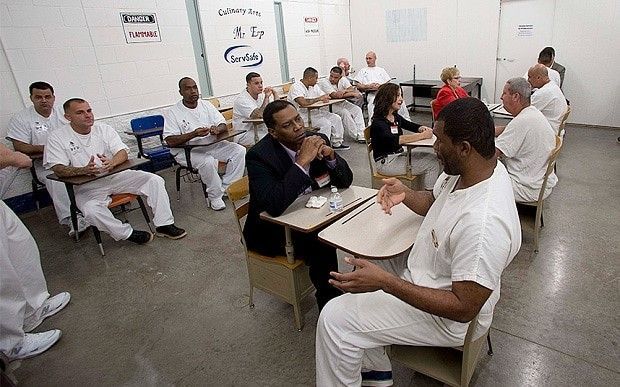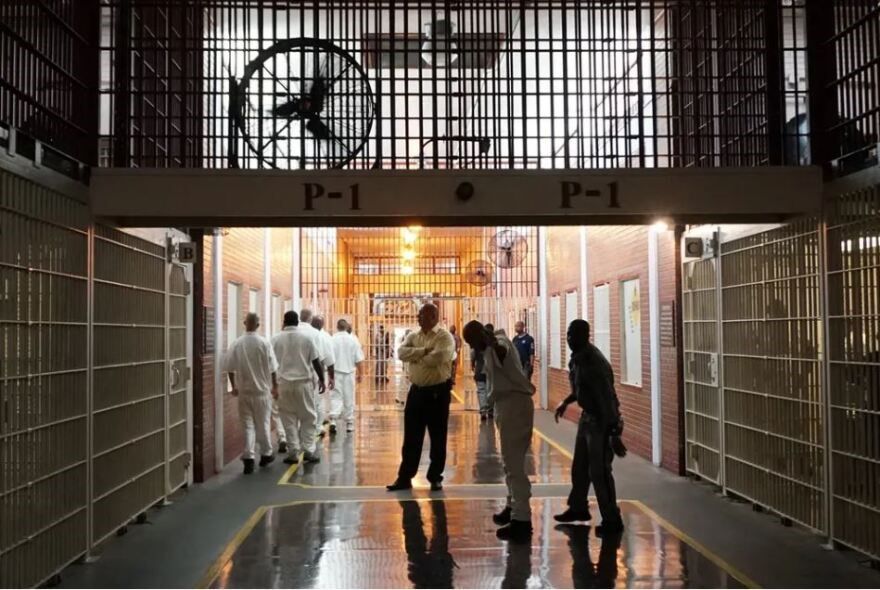Top 10 Texas
Parole Attorneys

VOL. 1 Wed. Oct. 30, 2024 |
toptexasparoleattorneys.org
TOP TEXAS
PAROLE NEWS
Latest News and Bulletin Updates
P.O. Box 385 | Livingston, TX 77351
Texas Board of Pardons
and Paroles and TDCJ
Intentionally Releasing
the State's Worst
Criminals On To Our Streets
Texas Parole Insider Leaks TDCJ
and The Board of Pardons and
Paroles' Dirty Laundry
By Anonymous Parole Attorney,
Interviewed by Institute for Attorney Oversight
No one can deny that violent crime is a growing problem in Texas, particularly in cities like Houston, Austin, and Dallas. Many believe this is simply a sign of the times, a reflection of a society in decline. Some right-leaning Texans might attribute it to illegal immigrants and criminals crossing our southern borders. But what if this surge in crime isn’t just happening by chance? What if it is calculated and orchestrated by the very people we have appointed and entrusted to work on our behalf and in our best interests—the citizens of Texas?

'No one can deny that violent crime is a growing problem in Texas, particularly in cities like Houston, Austin, and Dallas.'
Intentional Endangerment by Officials
What if these officials have, for years, been intentionally and deliberately putting every citizen of the state in very real and present danger, expecting and anticipating that many Texans will be victimized, harmed, or even killed to further their political and economic agendas?
The Parole Paradox
When the Institute for Attorney Oversight asked me why the Texas Board of Pardons and Paroles often grants parole to inmates with histories of assaultive behavior, involvement in fights, extortion, drug offenses, assaults on staff, cell phone possession, and poor disciplinary records, while denying parole to inmates who have taken every class, gone to work every day, participated in every available program, stayed out of trouble, earned college credits, and made every effort to rehabilitate themselves, my answer was simple: you don’t want to know the truth.

'...while denying parole to inmates who have taken every
class, gone to work every day, participated in every avail-
able program, stayed out of trouble, earned college credits, and made every effort to rehabilitate themselves.'
The Insider's Perspective
Texas parole is my livelihood, and I am very good at what I do. However, if I were to go on record, my career would end in an instant despite my expertise. So, I urge you not to take my word for it but to conduct your own due diligence and research. Everything I am about to reveal in this “off the record” interview can be definitively proven.
Historical Context and Policy Shifts
First, understand that Texas has always been a “hard on crime” state. This began to change about ten years ago when the “stop mass incarceration” movement gained traction, even here. People grew tired of the economic and social drain caused by mass incarceration. Both Democrats and Republicans pushed for criminal justice reform. The federal government, refusing to support Texas’s overinflated prison system any longer, cut their budget and told them, “You have a parole system… use it!” This dealt a crippling blow to a multi-billion-dollar industry, and they’ve been planning a comeback ever since.

'"You have a parole system... us it!" This dealt a crippling blow to a multi-billion-dollar industry, and they've been planning a comeback ever since.'
The Strategy to Revert Reforms
To shift the tide from criminal justice reform back to “hard on crime,” the Texas prison industry needed to make the state dangerous so that its citizens would feel the need for a protector. What better way to do that than to release the state’s most dangerous and violent prisoners into our communities? The plan is actually working. We hear calls to be tougher on crime in political ads all over the airwaves. People are scared, and they have good reason to be. But it isn’t just a coincidence that violent crime is up.
The Reality of Parole Decisions
For several years now, parole has been denied to prisoners in TDCJ who have made legitimate efforts to change and rehabilitate themselves. At one point, inmates who were case-free for their entire sentence were being denied parole for “manipulating the system.”
The Broken Parole System
Yes, believe it or not, if an inmate stayed out of trouble for their entire sentence until parole eligibility, they would be penalized and required to stay in prison for an additional year unless they got into some sort of trouble. What kind of message does that send to prisoners, and what sort of rehabilitation system is that? The answer is simple: it’s a broken and corrupt system that rewards bad behavior and penalizes good behavior.

'...it's a broken and corrupt system that rewards bad behavior and penalizes good behavior.'
Impact of COVID-19
The problem has only been exacerbated since COVID-19. Like much of the country, the Texas Department of Criminal Justice (TDCJ) suffered a labor shortage after the pandemic, which it has yet to recover from. Virtually every unit in TDCJ is short-staffed.

'Virtually every unit in TDCJ is short-staffed.'
The problem has only been exacerbated since COVID-19. Like much of the country, the Texas Department of Criminal Justice (TDCJ) suffered a labor shortage after the pandemic, which it has yet to recover from. Virtually every unit in TDCJ is short-staffed. TDCJ simply does not have the manpower to run the majority of its prisons, and once again, the prisoners who are staying out of trouble are paying the price. It’s much easier to run a prison full of model inmates than a prison full of combatants.

'It's much easier to run a prison full of model inmates rather than a prison full of combatants.'
The Response to Staffing Issues
As a result, TDCJ and the Board of Pardons and Paroles have tried to remedy the problem by releasing the inmates that are difficult to manage while denying parole to inmates who help keep the system running smoothly. It’s a commonly known fact that statistically, an inmate coming straight out of G4 or G5 (prisoners who, because of disciplinary issues, have been on medium or closed custody) has a much better chance of making parole than an inmate graduating college.
The Real Cost of a Faulty System
TDCJ simply does not want to deal with the bad actors, which means we, as the citizens of Texas, get to deal with them. Meanwhile, those prisoners who are actually trying to change their lives rot away year after year. In many cases, when they are only months from discharge (having served their entire sentence day for day), they are granted parole to keep the parole board’s numbers up. The prisoner will then be set free to do the last 6-9 months of their sentence on the streets.
Misconceptions About Merit-Based Parole
Most people believe that the Texas parole system is merit-based, meaning that someone goes to prison and is given the opportunity to be released early on parole if they stay out of trouble and show that they have made efforts to rehabilitate themselves. That is 100% false. Ninety-five percent of all parole decisions have absolutely nothing to do with an inmate’s behavior while in TDCJ. In fact, 90% of paroles denied in Texas are denied for one of two reasons: Nature of Offense and/or Prior Criminal History—two things a prisoner can never hope to change.
The Injustice of Parole Decisions
Ironically, many murderers and armed robbers with extensive disciplinary records while in prison are released their first time up for parole, while people with DWI or simple drug cases are denied parole for decades for the nature of the offense and/or criminal history. This should be illegal. It allows the parole board to retry the case without hearing any of the evidence. It’s double jeopardy without the benefit of a new trial.
A Call for Change
If families really want change, they need to push to have these two reasons removed from the decision process.
Sentencing Guidelines and
Judicial Awareness
The judge in every case in Texas is fully aware of the nature of the offense and the criminal history of the individual before sentencing. Texas has sentencing guidelines in place to ensure that the punishment is more severe when the crime is more severe. For example, a simple robbery with no weapon is punishable with a sentence of no less than two years and no more than twenty. A robbery with a deadly weapon, on the other hand, is punishable with a sentence of no less than five years and a maximum of ninety-nine years or life. Additionally, even if both are sentenced to the same five-year sentence, the armed robbery will not be eligible for parole until half the sentence is completed, while the simple robbery is eligible to see parole less than a year into the sentence. The nature of the offense is already accounted for in the sentencing.
Considering Criminal History
The criminal history is also taken into account by the courts before sentencing. For example, if someone is arrested for armed robbery and has a prior conviction for the same offense, their sentencing minimum is raised from five to ninety-nine years to fifteen to ninety-nine years. The judge does, however, have the option to forgo the “enhancement,” but if they do so, it’s because they have weighed the evidence and made a “judgment call.” The case should not be retried by the Parole Board in the roughly 10 minutes they have to make their decision to grant or deny parole.
The Consequences of a Corrupt System
To summarize, yes, it is my opinion that the Texas Board of Pardons and Paroles and TDCJ have conspired to intentionally make Texas communities a much more dangerous place. The violence we see on our streets is a direct consequence of their deliberate and planned efforts to saturate our communities with the most dangerous and violent criminals in the Texas prison system. This strategy aims to make Texans once again support a hard-on-crime stance and push for more prisons, which means more money for the Texas prison industry and everyone involved. Every time someone is robbed or murdered by a parolee, they come a little closer to their goal.
Reforming the System
In the meantime, the prisoners in the system who are genuinely trying to change and rehabilitate themselves are unfortunately rotting away. But the problem won’t be solved by building new prisons or pouring money into an already broken system. Change will come by making TDCJ and the Board of Pardons and Paroles more transparent about their decision-making process. The whole system needs to be overhauled, and people need to be held accountable at the highest levels. A merit-based system aimed at rehabilitation, not a toss of a coin, needs to be implemented. Because as of now, THERE IS NOTHING ANYONE CAN DO TO MAKE PAROLE IN TEXAS!!
Call to Action for Change
For those on the inside, the best advice I can give you is to pray! For the loved ones on the outside… Demand Change!!!
Empowering Families to
Demand Accountability
As I said in the beginning, don’t take my word for it. Demand to see the numbers. I’m guessing that many of the readers of this article will be family members of prisoners. Ask them to help you document specific cases of individuals who have very similar cases but where one gets denied parole and the other is granted. Most often, it will be the one with the lengthy disciplinary history that makes parole and the one who participates in all the rehabilitation programs that is denied parole. Take your evidence to the media and demand accountability. That is how you bring about change!

TDCJ and The Board of Pardons and Paroles Releasing Most Dangerous and Violent Prisoners While Denying Parole to Model Inmates!! These are the allegations claimed in the following article.
If these allegations are true IAO would like to document and memorialize specific instances so that we can push for change. But we need solid verifiable proof to do so.
We welcome any and all TDCJ and parole news and will post and share any relevant content by prisoners and/or family and loved ones of prisoners. If you want change this is your opportunity to make it happen!!

